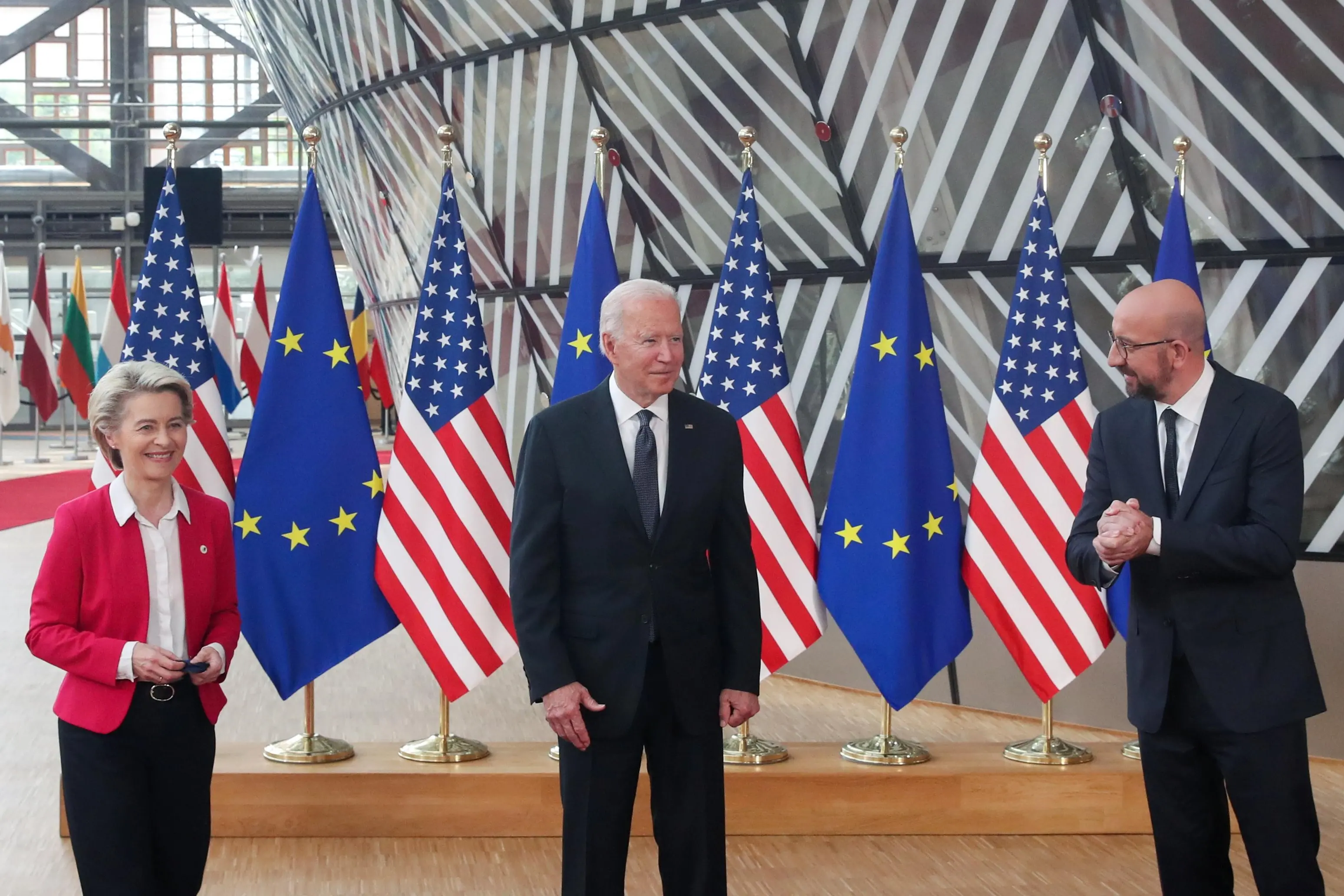PHOTO
After taking office on Jan. 20, US President Joe Biden initially focused on the pandemic and domestic priorities, but he has a long history of foreign policy experience and appeared eager to rebuild alliances with European partners on his first trip abroad this month. While it is too early to assess the outcome of his policies, he has been very successful in the realm of foreign public opinion. Public perceptions of the US among traditional allies have dramatically flipped from largely negative to largely positive since Biden took office.
The Pew Research Center recently released analysis from a survey of 16 countries representing traditional US European allies, plus Canada and a few Asian allies. Large majorities in each country — ranging from 63 percent to 85 percent — said they have confidence in Biden “to do the right thing regarding world affairs.”
This represents a significant change from foreign perceptions during Donald Trump’s presidency. Among publics in the 12 countries for which there is both 2020 and 2021 data, 83 percent in 2020 said they had “no confidence” in Trump, compared to 75 percent today who express “confidence” in Biden. These gaps are dramatic, though the Pew analysis notes that Barack Obama scored even higher during his presidency.
Polls also find a major shift in US favorability ratings that coincide with Biden’s time as president. In 2020, Pew found that 63 percent of respondents had an unfavorable view of the US; today, that is almost completely reversed, with 62 percent having a favorable view. Of the 16 countries included in the 2021 survey, majorities in each country have a favorable view of America, except for New Zealand. An April Morning Consult survey of a somewhat different set of 14 countries found less dramatic but similar results, with a nine-point increase in favorable views of the US since Biden took office.
Based on the available data, there are few exceptions. While the Pew survey focused on traditional, close US allies, the Morning Consult poll included some other countries. Most of them also showed improvements in views of the US under Biden: A 10-point improvement in Brazil, three-point increase in India, six-point gain in Russia, and 15-point rise in Mexico. However, Morning Consult found a 13-point decline in Chinese views of the US, where unfavorable views now stand at 74 percent. Pew found a small dip in Taiwanese views, down to 61 percent today from 68 percent in 2019.
Of course, the surveys still leave many countries unrepresented, including some that might be less likely to approve of Biden. However, Biden’s foreign policy focus has been on repairing relations with traditionally close allies and managing competition with China. In these terms, he is succeeding, due to both his own character and his specific policies.
The Pew survey found that 77 percent of publics in 12 countries see Biden as “well-qualified” to be president, while only 16 percent said the same about Trump. Similarly, 72 percent described Trump as “dangerous” and 92 percent as “arrogant,” compared to 14 percent and 13 percent, respectively, for Biden. While 46 percent saw Trump as a “strong leader,” Biden scores at 62 percent. The perception of Biden as qualified and strong without very negative characteristics is one factor behind the overall more positive views of him.
Biden is also pursuing policies that are popular among European and Asian allies. The Pew poll found that his decision to rejoin the World Health Organization and the Paris climate accord, after Trump had withdrawn the US, were very popular in the countries surveyed this year. Respondents also strongly approved of Biden’s plan for a summit of democracies and intention to reverse Trump’s steep cuts in the number of refugees that the US resettles. Biden’s firm commitment to NATO also aligns with the views of majorities in most NATO states.
Biden still faces some challenges, even among supportive publics. In the Pew survey, 56 percent of respondents said that the US is only “somewhat reliable” as an ally. The Trump presidency, growing partisanship and the Jan. 6 Capitol riots have damaged views of the country, with respondents evenly divided about whether the US political system is functioning well or that it “used to be a good example” of democracy but has not been recently. Foreign observers who thought someone like Trump would never become president now know that is not true and Trump or a similar candidate could be president in the future. That reality, combined with uncertainty about the US as an ally and a democracy, present hurdles for Biden to overcome in regaining credibility with traditional allies.
Meanwhile, Americans are likely to see Biden as respected abroad but are divided in their views of how the world sees their country. A February Gallup poll found that 58 percent of Americans believe that world leaders respect Biden, compared to 37 percent who felt that world leaders respected Trump. Among Democrats, 53 percent now say that much of the world has favorable views of the US, a cautious improvement over their views during the Trump years. During the Trump presidency, Republicans felt confident that much of the world had a favorable view of the US, peaking at 81 percent; but that number has crashed to 44 percent. However, polls of foreign publics suggest that Republicans’ perceptions of how the world viewed the country during the Trump administration did not reflect reality.
- Kerry Boyd Anderson is a writer and political risk consultant with more than 16 years’ experience as a professional analyst of international security issues and Middle East political and business risk. Her previous positions include deputy director for advisory with Oxford Analytica and managing editor of Arms Control Today. Twitter: @KBAresearch
Copyright: Arab News © 2021 All rights reserved. Provided by SyndiGate Media Inc. (Syndigate.info).





















